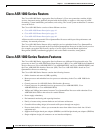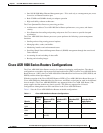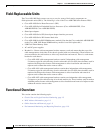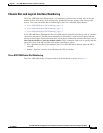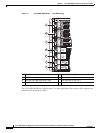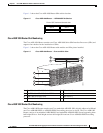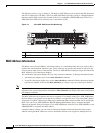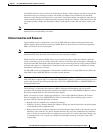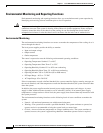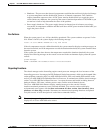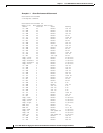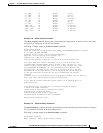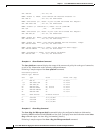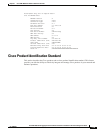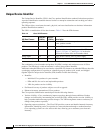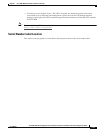
1-10
Cisco ASR 1000 Series Aggregaion Services Routers Hardware Installation and Initial Configuration Guide
OL-13208-03
Chapter 1 Cisco ASR 1000 Series Routers Hardware Overview
Functional Overview
Environmental Monitoring and Reporting Functions
Environmental monitoring and reporting functions allow you to maintain normal system operation by
identifying and resolving adverse conditions prior to loss of operation.
Caution To prevent overheating the chassis, ensure that your system is drawing cool inlet air. Over temperature
conditions can occur if the system is drawing in the exhaust air of other equipment. Ensure adequate
clearance around the sides of the chassis so that cooling air can flow through the chassis interior
unimpeded and exhaust air exits the chassis and is not drawn into the inlet vent of another device.
Environmental Monitoring
The environmental monitoring functions use sensors to monitor the temperature of the cooling air as it
moves through the chassis.
The local power supplies provide the ability to monitor:
• Input and output voltage
• Output current
• Outlet temperature
The router is expected to meet the following environmental operating conditions:
• Operating Temperature Nominal: 5° to 40°C
• Operating Temperature Short Term: 5° to 55°C
• Operating Humidity Nominal: 5% to 85% non-condensing
• Operating Humidity Short Term: 5% to 90% non-condensing
• Operating Altitude: 198 to 13,200 feet (60 to 4000 meters)
• DC Input Range: –40.5 to –72 VDC
• AC Input Range: 85 to 264 VAC
If the air temperature exceeds a defined threshold, the system controller displays warning messages on
the console terminal, and if the temperature exceeds the shutdown threshold, the system controller shuts
down the system.
In addition, the power supplies monitor internal power supply temperatures and voltages. A power
supply is either within tolerance (normal) or out of tolerance (critical). If an internal power supply
temperature or voltage reaches a critical level, the power supply shuts down without any interaction with
the system processor.
The environmental monitoring functions use the following levels of status conditions to monitor the
system:
• Normal—All monitored parameters are within normal tolerances.
• Warning—The system has exceeded a specified threshold. The system continues to operate, but
operator action is recommended to bring the system back to a normal state.
• Critical—An out-of-tolerance temperature or voltage condition exists. The system continues to
operate; however, the system is approaching shutdown. Immediate operator action is required.



